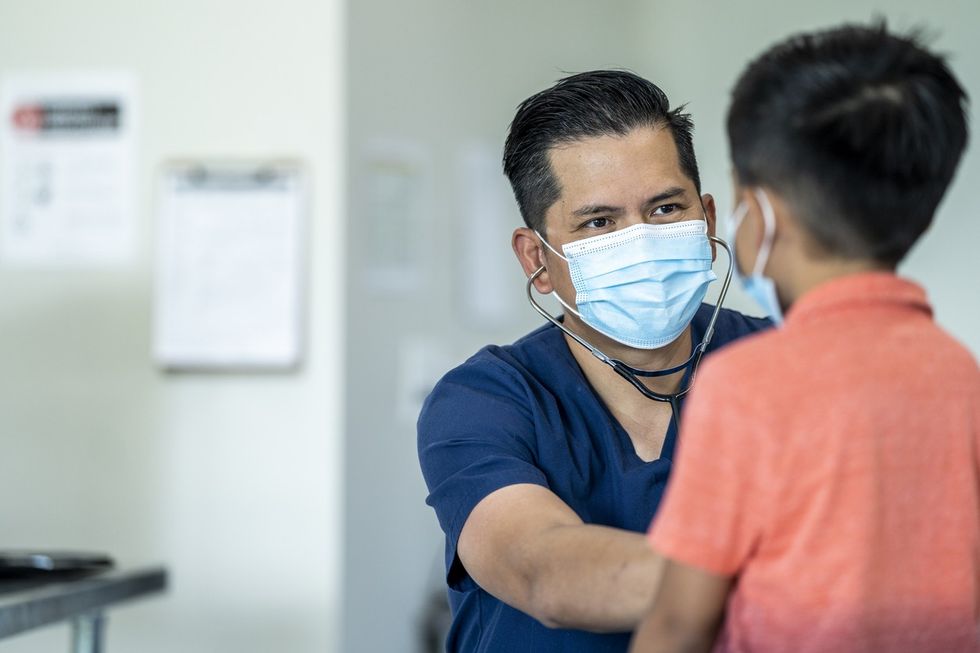by LAUREN CODLING
A FATHER whose daughter was diagnosed with a Covid-19 related syndrome affecting children has warned parents to be aware of symptoms, as data suggests the disease may disproportionately affect those from an ethnic minority background.
Paediatric Multisystem Inflammatory Syndrome (PIMS) is a new illness, in which children suffer from inflammation throughout their body. If untreated, the inflammation can cause tissue damage, poor function of vital organs or even death. Although the cause of PIMS is not yet known, experts believe it may be associated with the Covid-19 virus.
In recent weeks, statistics have suggested the disease has mostly affected children from an ethnic minority background. Earlier this month, The Guardian revealed unpublished data which alleged 75 per
cent of the children worst affected by PIMS were from an ethnic minority background.
According to figures provided to Eastern Eye by Evelina London Children’s Hospital, approximately 60 per cent of their patients were from BAME community in the first wave of PIMS. This predominance was not apparent in the second wave, and there is currently no available data on the proportion of BAME children affected this year.
'We had no awareness of PIMS'
Minesh Sadhu’s* eight-year-old daughter Aditi* was admitted to hospital with PIMS earlier this month. The father-of-two, from Watford in Hertfordshire, described the experience as “the scariest
time of his life”. He wants other parents to be aware of the symptoms, so they know to call for medical assistance if they need it.
“A lot of people may believe it is (a mild illness) and don’t realise how severe it is,” he told Eastern Eye. “If it isn’t caught early, the illness can go either way. Seeing my child in that condition and literally not knowing what was going to happen and not knowing much about it…it was the scariest time of my life.”
Symptoms of the disease include a fever, stomach pain, diarrhoea, vomiting, rash, cold hands and feet, and red eyes.
Sadhu was first alerted to his daughter feeling unwell when she complained of a persistent backache. Aditi had just completed a virtual dance lesson so Sadhu and his wife were not overly concerned at first, believing their daughter may have pulled a muscle.
Later that evening, her temperature and the back pain increased. At first, Sadhu treated the illness like a cold and gave his daughter painkillers. However, her condition worsened and they began to see “little spots” on her body, which resembled a heat rash. The couple called the NHS 111 service and they were told to bring her to hospital.
When they were informed Aditi had PIMS, neither Sadhu nor his wife had heard of the illness before. “Neither of us knew what PIMS was, until we were in the hospital and speaking to a doctor and obviously, because we didn’t know about it, we didn’t check for any of those symptoms,” he said, noting he had not seen anything about the syndrome in the media. “We had read that children were not badly affected by Covid,” he said, “but now we know this disease is linked to it.”
Both Sadhu and his wife had contracted coronavirus over December. Although Aditi was tested, her test results came back as inconclusive.

Evelina’s consultant paediatrician and PIMS expert, Dr Jennifer Handforth, admitted that they were “concerned” by the initial proportion of patients from the BAME community. However, Handforth said she did not want to scare monger families. “This is a very rare condition,” Dr Handforth told Eastern Eye. “But we do want parents to have a lower threshold for reaching out and asking for medical advice if they are concerned.”
Dr Liz Whittaker, infectious diseases lead for the Royal College of Paediatrics & Child Health (RCPCH) and PIMS expert, agreed. According to the RCPCH, the syndrome occurs in less than 0.5 per cent of children who have (or who have had) coronavirus. Most children with the condition will not be seriously affected, Whittaker added.
However, Dr Whittaker did raise additional concerns that some parents may be reluctant to take their child to hospital as they are worried about catching coronavirus. She has reassured parents hospitals have protocols in place, to ensure Covid-19 patients are not mixed with others. “We’d really urge parents and carers to bring their children to hospital if they are really worried, we wouldn’t want them not to be seen,” she told Eastern Eye. “When we treat these children in a timely fashion, they respond very well. If there were delays, they would still get better – but it’s just harder (to treat).”
She added: “This is still quite an unusual condition, but all of our hospitals are open, all of the usual avenues are available and we’re always more than happy to see children if parents are worried.”
Why are BAME children disproportionately impacted by PIMS?
The reasons behind the disproportionate effect on BAME children are uncertain. However, both Handforth and Whittaker believe it could be down to family members working on the frontline or living in multi-generational households, therefore being more at risk of catching Covid. “There is research being carried out, to determine whether it’s more to do with socio-economic factors rather than something to do with genetics or ethnicity,” Dr Handforth noted. “We don’t have the answers yet, but I suspect there will be various contributing factors.”
When Eastern Eye spoke to Sadhu last week, his daughter had been discharged from hospital several days earlier. She is recovering well, although she is taking medication and has to attend several follow-up appointments in the future.
He hopes sharing his story will encourage parents to look for the symptoms in their children.“There isn’t much awareness of it out there,” he said, “I hope that people becomes aware of the symptoms and respond to it in the correct way.”
*Names changed to protect identities
For more information, see: https://www.rcpch.ac.uk/resources/pims-covid-19-linked-syndrome-affecting-children-information-families


















 Heehs describes two principal approaches to biographyAMG
Heehs describes two principal approaches to biographyAMG